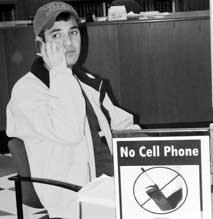The second floor computer lab in Middleton Library was silent Friday afternoon except for the hum of computers and the clicks of keyboards and mice.
But the study haven’s tranquility broke at 3:15 p.m. when an electronic “chirping” version of “Hey Fightin’ Tigers” burst into the sound waves.
The song might rouse University students to howls and shouts on game days, but the song was met with only silence and stares Friday.
“Hello?” Andrew Brown sheepishly answered in a hushed voice as computer users turned their heads to see which culprit was breaking the silence.
Brown, a mechanical engineering sophomore, said he forgot he had left his cell phone ringer on.
“I thought it was on vibrate,” he said.
Friday’s broken silence is a familiar sound at LSU – a place where almost everyone has a cell phone.
On any given day, professors’ lectures are interrupted by ringing cell phones, and students hastily reach into backpacks, purses and pockets to turn the noisy interrupters off.
People view spoken conversation with certain unwritten rules on which words, hand motions and even standing positions are appropriate.
Just as with other forms of communication, cell phone use has etiquette.
Carol Page, owner of a Boston public relations firm, created a Web site to help cell phone users learn to manage their cell phone behavior.
At www.cellmanners.com, visitors can learn about “Cell Wars,” which it describes as “a social upheaval occurring in the late 20th and early 21st century resulting from the introduction of the cell phone without an accompanying set of manners.”
In a telephone interview, Page said she started the site because people seem to “throw manners out the window” when they use cell phones.
“What I was seeing was a lot of tension being created,” she said. “People seem to forget that other people exist when they have a cell phone.”
The site’s logo is “promoting cell phone civility.”
Page was named the “Miss Manners of Cell Phones” by The New York Times because of the way she addressed what she called the “serious problem” of “Cell Wars.”
The site features polls to determine places where cell phones should be banned, a forum to ask questions about appropriate cell phone use and a list of cell phone slang.
The slang list includes terms like “cell yell” – the screaming voice many users take on as they talk – and “cell startle” – when people jump because another’s cell ring has scared them.
Some University students had their own specific ideas of cell phone etiquette.
Brown said even though he answered his phone Friday in the library, he was embarrassed because it disturbed people.
“It makes people look over,” he said. “It draws attention to you.”
Friday was not the first time Brown’s phone has gone off at an inconvenient or inappropriate time. His phone has rung in class, but he said a professor never has reprimanded him for it.
“I hate it whenever I forget to put it on vibrate in class,” he said.
Georgia Frederick, a studio art senior, said her cell phone has rung during class. But Frederick said she learned from her mistake.
“I turned it off,” Frederick said.
She has kept her cell phone turned off in class since then.
Frederick agreed with one of the “Miss Manners of Cell Phones” comments about answering cell phones in public.
“It’s assuming you’re the only important person in the room,” she said.
Nick Frederick, a graphic design junior and Georgia’s brother, gave a list of inappropriate places to talk on a cell phone, including one place cell phones are most known for.
“Pretty much inside any buildings,” he said. “Not in the car either.”
Leah Romero, a photography senior, summed up her reasons for trying to practice good cell phone etiquette on campus as a part of common courtesy.
“It’s rude to the professor and the people around you,” she said.
Web site offers cell phone etiquette coaching
November 25, 2003

Web site offers cell phone etiquette coaching



